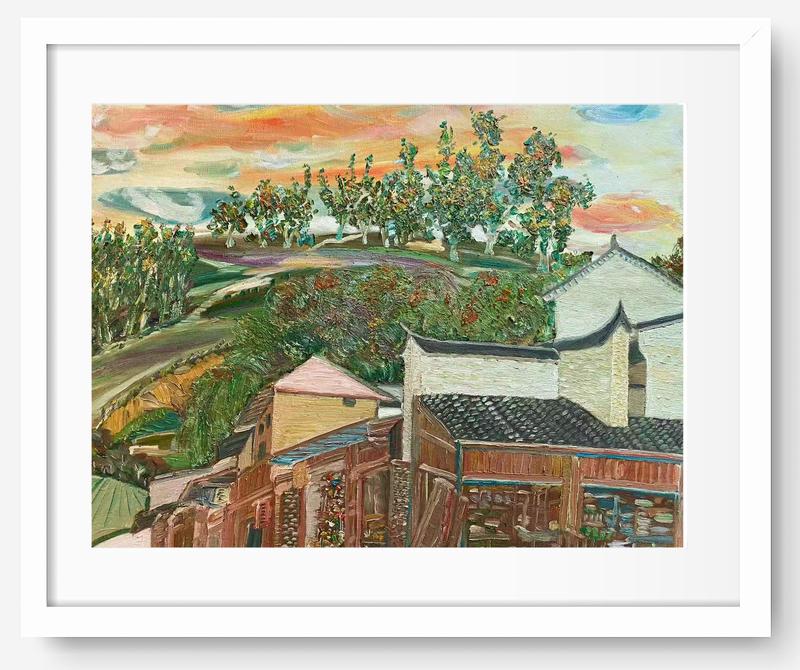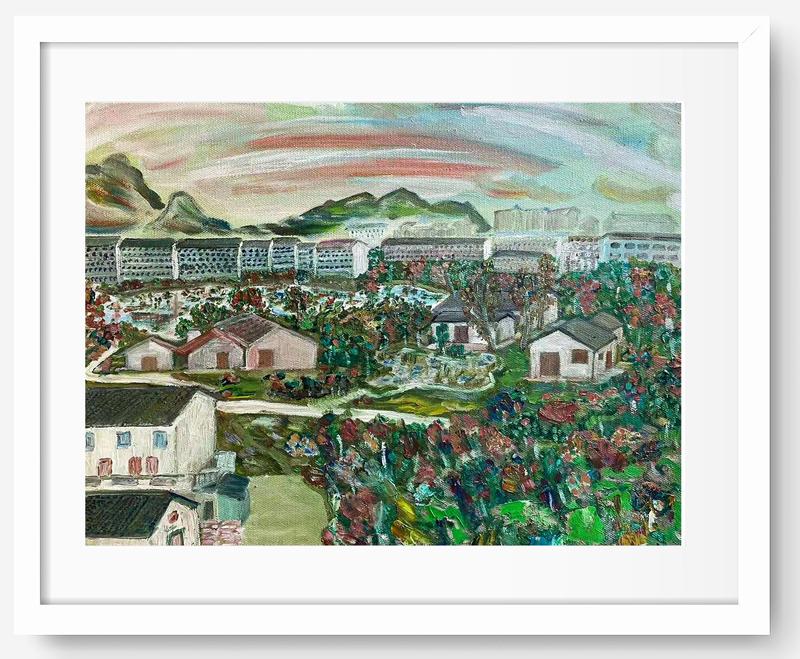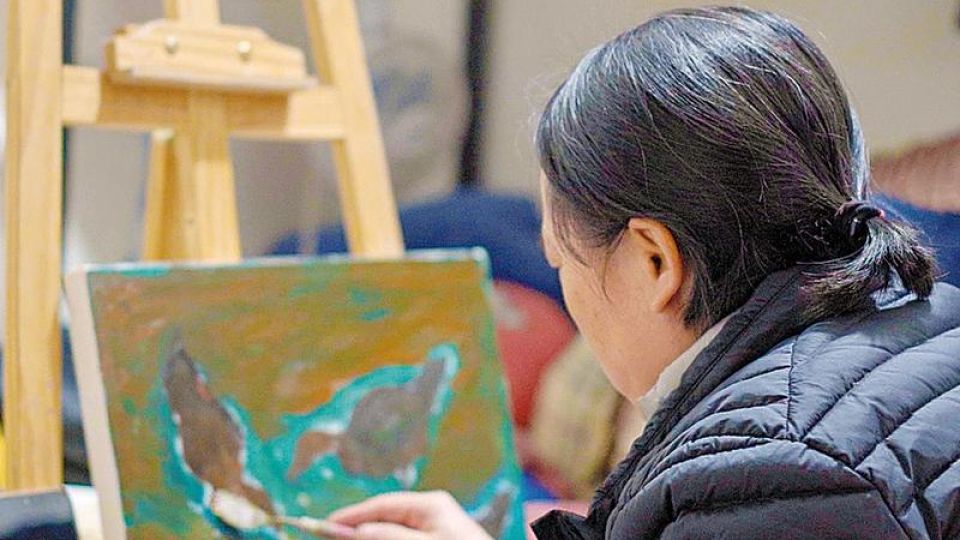June 20, 2022
BEIJING – The difference is night and day. By day a cleaner, by night an artist. With rags hanging on the wall and mops in the corner, as the evening draws in, 56-year-old Wang Liuyun focuses on her canvas in a small utility room at an office building in Beijing where, during daylight hours, she works as a cleaner.
From 7 am to 7 pm, Wang sweeps and mops the floors, empties trash bins, sanitizes restrooms and cleans windows in the building. After work, the 3-square-meter utility room in which she keeps her work equipment becomes her studio, where her oil paintings portray the outdoors. Scenes of trees, rolling mountains, lush fields and glistening lakes are conjured up in the cramped surroundings which smell not of pine needles or the forest, but of disinfectant and cleaning supplies. A piece of cardboard on the floor is her mattress.
Ever since I was a little girl, I have enjoyed observing nature, such as how clouds form, how grass grows and why water has no color. Maybe these have inspired my painting.
Wang Liuyun, 56, artist
“Painting feeds my soul, while the cleaning job helps make ends meet,” Wang says.
Before her painting journey began, Wang has no hesitance in using the word “miserable” to describe her life before the age of 50-dropping out of school at 17 due to economic pressure, trapped in an unhappy seven-year marriage, and losing her first husband in a car accident. She never dared to think that something fortunate would happen to her or that life could, perish the thought, be enjoyable.
When her daughter graduated from college and her rural home was finally decorated in 2017, the then 51-year-old Wang decided to live for herself and painting became her way to escape what seemed like a predestined fate.
“Ever since I was a little girl, I have enjoyed observing nature, such as how clouds form, how grass grows and why water has no color. Maybe these have inspired my painting,” says the artist, whose given name Liuyun itself provides a natural image of willow trees and clouds.
Wang catapulted to fame overnight and made national headlines after her story was recorded in an episode of the documentary series Waiting for You, which was released online in January, and records the stories of 100 women across the country over the course of a year.
On social media platform Sina Weibo, it has been viewed more than 7.5 million times. A user named Qijiu comments: “I am touched by her passion for life and art. Even in her 50s, she has the guts to start over and pursue her passions.”
Many people contacted her to buy her works. Their prices range from hundreds to thousands of yuan.
“It is beyond my expectation that I, a ‘nobody’, can get so much attention from the media and on the internet,” Wang says, smiling.
In her own words, she spent 50 years in the countryside as a farmer, and at 51, she decided to make a difference.

A Corner of an Ancient Town, created by Wang Liuyun, depicts an autumn scene in Shuangxi ancient town of Fujian province. (PHOTO PROVIDED TO CHINA DAILY)
Drawing on a dream
In 2016, when she heard that there was a free painting course in Shuangxi ancient town, East China’s Fujian province, Wang, the then 50-year-old farmer and housewife in Taizhou, East China’s Zhejiang province, knew that it was time to restart her life. Although married twice, happiness seemed elusive.
“The timing was right, because my daughter graduated from college and my rural home was decorated,” she recounts, adding that at first, she wanted to use painting as a way to release her emotions.
Wang left her home in Shang’ao village, Zhejiang province, in March 2017, with just a few hundred yuan to her name, and started a week’s study at a charity program initiated by artist Lin Zhenglu in Fujian.
“Providing paint, brushes and canvas for free, teacher Wang Yafei told me to paint whatever I wanted. On the fourth day, I finished my first picture, depicting a springtime scene in the town, with rapeseed flowers blossoming in the fields,” Wang Liuyun says. She completed another two paintings on the fifth and sixth day.
“Although Lin kept saying that I had a talent for landscape painting, I didn’t believe that,” she recalls.
Wang Liuyun left the studio with just enough money to get back home. Shortly after leaving, her three paintings were sold, each for 150 yuan ($22.32).
“It boosted my confidence and I began to take painting seriously. It not only keeps me entertained, but also makes money,” she says.
Borrowing 5,000 yuan from the local rural credit cooperative, Wang Liuyun went back to Lin’s studio and decided to stay longer. Renting a hotel room for 600 yuan a month, she could get a canvas board every day and two paintbrushes and three pigments every week from the studio.
“I enjoyed every day in Shuangxi. I kept drawing and painting without feeling tired.”
In three months, she finished more than 50 paintings. To promote her work, Lin helped her to open a small exhibition.
However, the happy days didn’t last long. Three months later, her husband borrowed money to go to Shuangxi to take her back home.
“There was gossip about me in the village. He was afraid that I would divorce him,” she explains.
Within a week of being back, Lin contacted her saying that all her works were sold, and had made a total sum of 20,000 yuan. Many people contacted her for paintings. She bought a smartphone to help her sell her work.
In 2018, she went to spend a year immersing herself in appreciating artworks in Shenzhen’s Dafen oil painting village in Guangdong province. She then became an art teacher at a rural primary school in Henan province in 2019. Due to the COVID-19 outbreak which led to the school’s shutdown, she had to quit that job and headed to Beijing to seek employment in early 2020.
It is the third year that Wang Liuyun has worked as a cleaner in Beijing, earning 4,500 yuan a month, but she never stops painting. For her, Beijing is a city of tolerance and displays a civilized hospitality, where she gains respect, fair treatment and security.

Another painting, Suburbs of Shuangxi Ancient Town, features a bird’s-eye view of the well-preserved ancient buildings in the town before rain. (PHOTO PROVIDED TO CHINA DAILY)
Uplifting force
Born into a poor family in rural Hunan province in 1966, Wang Liuyun is the fifth child. She has three sisters and a brother. Her father was born with a deformed spine, for which she was laughed at and mercilessly teased in school.
Although good at study, she dropped out of senior middle school at 17, because the family could not afford the expense. She had to take various jobs to feed herself.
When she was in her 20s, her parents died, which meant that she had to find someone to marry to make life easier. She met her first husband, who died in a car accident when their daughter was 7.
Four years after her husband’s death, she and her daughter moved to a coastal village in Zhejiang, where she met her second husband, “who gives me the spiritual freedom that I want”, she says.
For Wang Liuyun, who says she tends to feel lonely, her “soul mate “has been books. While in Zhejiang, whenever she had time, she would go to the local library and read voraciously, including Tang Dynasty (618-907) poems by Li Bai and Du Fu, as well as Russian literary classics.
When she first started learning how to paint, she was fascinated by Dwelling in the Fuchun Mountains, a famous landscape painting created by Huang Gongwang in the Yuan Dynasty (1271-1368).
She even went to the Fuchun Mountains in Zhejiang to appreciate the scenery, but found that the mountains were not as splendid as depicted in the painting.
“It was the moment that I realized what Huang painted was a scene in his dreams,” Wang Liuyun says.
It is also why she has been fascinated by painting, which she sees as an escape from reality and a tool to help people to heal.
“I make a living in the dirt, but I paint in the clouds,” she says.


